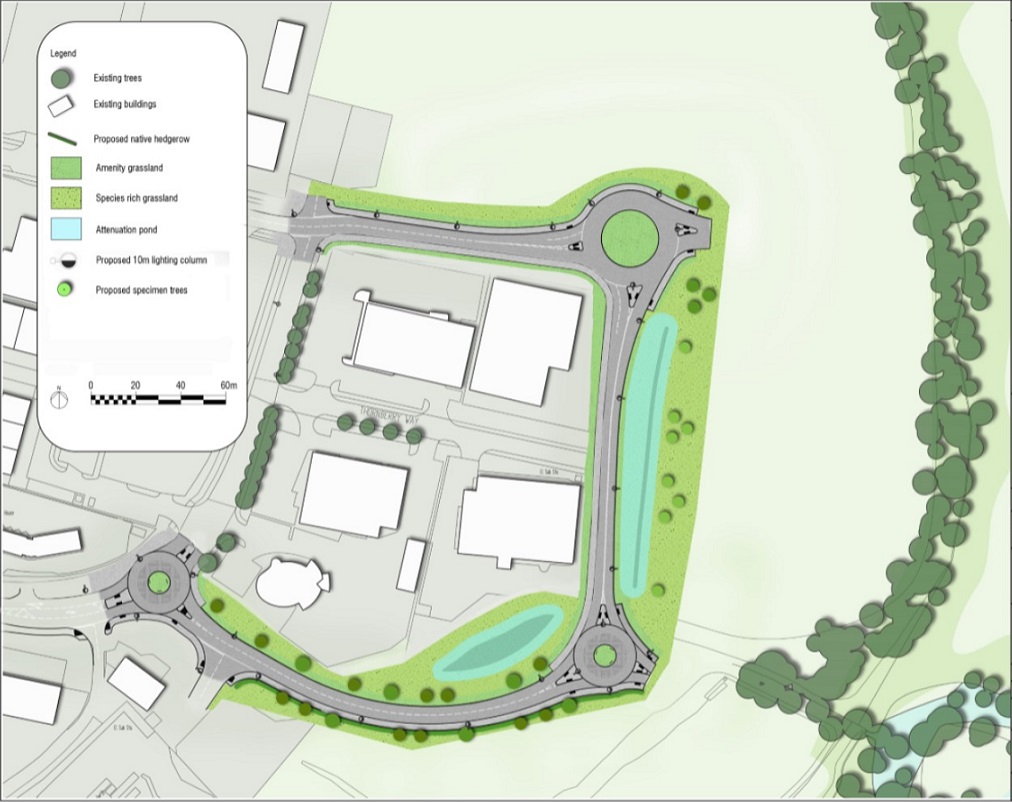 Abraham Lincoln
If given the truth, the people can be depended upon to meet any national crisis...
Abraham Lincoln
If given the truth, the people can be depended upon to meet any national crisis...
 Guildford news...
for Guildford people, brought to you by Guildford reporters - Guildford's own news service
Guildford news...
for Guildford people, brought to you by Guildford reporters - Guildford's own news service
New Internal Road For Slyfield Industrial Estate
Published on: 25 Feb, 2019
Updated on: 26 Feb, 2019
Work is to start soon on constructing a new internal road at the Slyfield Industrial Estate, Guildford.
The new road is intended to reduce traffic in and around the estate. It is also planned to eventually enable the relocation of the council’s depot and Thames Water’s sewage works and bring forward housing on what the borough council consider to be Guildford’s largest brownfield site.

Plan of the new Slyfield internal estate road. The roundabouts on the shaded new section of road are to enable access to the new depot and other facilities when they are moved from their existing locations within Slyfield.
£10.439m has been approved by the council for the detailed design and construction of the road which is expected to be completed by early 2020. Balfour Beatty has been appointed to build the new road.

Cllr Paul Spooner.
The council confirmed that it does not form part of the Clay Lane Link Road scheme that, following resident feedback, was scrapped in February 2016.
The leader of Guildford Borough Council, Cllr Paul Spooner said: “The new internal road is key to the wider regeneration of the area, serving as a catalyst for reinvestment in the estate creating more job opportunities and unlocking the potential of brownfield land being utilised for new housing as laid out in our Local Plan.”
The deputy leader of Guildford Borough Council, Cllr Matt Furniss, added: “Traffic management will be put in place and we will do all we can to minimise any disruption throughout the duration of the works.”

Cllr Matt Furniss.
The Guildford Dragon NEWS asked if Thames Water had agreed to relocate the sewage works and at what cost. A council spokesperson said: “We continue our commercially sensitive and confidential discussions with Thames Water about regenerating the Slyfield area, and will update everyone with further details at the appropriate time in this long-term project.”
Responses to New Internal Road For Slyfield Industrial Estate
Leave a Comment Cancel reply
Please see our comments policy. All comments are moderated and may take time to appear. Full names, or at least initial and surname, must be given.
Click on cartoon for Dragon story: Public Asked for Views on SCC’s Proposal for Reduced Speed Limits


Recent Articles
- Residents Urged to Have Their Say on the Changing Shape of Surrey’s Local Government
- Driver Given Suspended Sentence After Serious Collision With Motorcycle
- Birdwatcher’s Diary No.329
- Opinion: We Must Plan To Deal with Guildford Gridlock
- A281 Closure – Further Delay to Re-opening
- Centenary of Wood Street’s First Place of Worship, my Baptism Link with It and the Revd Deedes and his Family
- Care For Guildford Asks: Could You Be One Of Our Volunteers?
- Flashback: There Are Lessons To Learn from the Juneja Case – The Council Must Admit It
- GBC’s Plan For a Thriving Guildford ‘Is Our Promise to Residents’ Says Council Leader
- Highways Bulletin: Campaign for Better Transport


Recent Comments
- Richard Benson on GBC’s Plan For a Thriving Guildford ‘Is Our Promise to Residents’ Says Council Leader
- Nigel Base on Letter: Recreational Rowing Might Be the Answer
- Anna Windebank on GBC’s Plan For a Thriving Guildford ‘Is Our Promise to Residents’ Says Council Leader
- Caroline Turnbull on Letter: Recreational Rowing Might Be the Answer
- Caroline Freeman on Letter: Recreational Rowing Might Be the Answer
- David Roberts on Letter: Recreational Rowing Might Be the Answer
Search in Site
Media Gallery
Dragon Interview: Local Artist Leaves Her Mark At One of England’s Most Historic Buildings
January 21, 2023 / No Comment / Read MoreDragon Interview: Lib Dem Planning Chair: ‘Current Policy Doesn’t Work for Local People’
January 19, 2023 / No Comment / Read MoreA3 Tunnel in Guildford ‘Necessary’ for New Homes, Says Guildford’s MP
January 10, 2023 / No Comment / Read More‘Madness’ for London Road Scheme to Go Ahead Against ‘Huge Opposition’, Says SCC Leader
January 6, 2023 / No Comment / Read MoreCouncillor’s Son Starts Campaign for More Consultation on North Street Plan
December 30, 2022 / No Comment / Read MoreCounty Council Climbs Down Over London Road Works – Further ‘Engagement’ Period Announced
December 14, 2022 / No Comment / Read MoreDragon Interview: GBC Reaction to the Government’s Expected Decision to Relax Housing Targets
December 7, 2022 / No Comment / Read MoreHow Can Our Town Centre Businesses Recover? Watch the Shop Front Debate
May 18, 2020 / No Comment / Read More






Sean Jenkinson
February 26, 2019 at 6:32 am
Without the link road and another way out of Slyfield this will make little difference. No link road just like no widening of the A320, both would ease the traffic in an around Slyfield, but if the residents are happy with cars and lorries queuing up, chugging out toxic fumes who are we to argue, flowing traffic would cause less pollution.
David Smith
February 26, 2019 at 8:10 am
I agree, the proposed link road was the one thing about the Slyfield regeneration that made sense.
Jim Allen
February 26, 2019 at 8:49 am
£10.4 million for a road less than 3/4 mile long. That’s a bit expensive. Could it be the contamination of the soil causing problems?
As for Thames water – 15 years of stating, (read between the lines in the 2018 TWPLC company financial report which clearly states) they ain’t paying to move. We have had a commercially sensitive, confidential discussion going on for 15 years and soon a new GBC Executive in May.
The public has a right to know if a public utility, providing a public service to the residents, is going to function when the new, expanded town is built. It should not be kept secret.
What happened to “open government”. For all the time it is talk, talk not work, work. Housing is being built with no sewer capacity to service them. It’s time GBC came clean.
The direction of a ‘link’ road should be based on where those using the estate want to travel from or to – just randomly picking open land to place tarmac serves no purpose. In reality, there is adequate road space to exit the current Slyfield if only vehicles parked on site and not in the road.
As for this SARP project, 15 years to get nowhere suggests the trajectory and commercial confidential viability has something to do with keeping a failed project going because no one has the backbone to admit it is going in the wrong direction.
John Murphy
February 26, 2019 at 9:47 am
Can not quite work out where the entrance to the council depot is on the map.